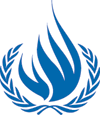UN Voluntary Trust Fund Makes Small Grants Available to Fight Slavery
 The United Nations Voluntary Trust Fund on Contemporary Forms of Slavery makes grants available for up to $15,000 for programs of humanitarian, legal and financial assistance to individuals whose human rights have been violated as a result of contemporary forms of slavery. Human trafficking and restaveks are just two areas where these funds could make a difference in Haiti. No awards were given for Haitiian programs last year, but hopefully a number of organizations will apply this year. Attached and below is background on this fund and the programs it supports.
The United Nations Voluntary Trust Fund on Contemporary Forms of Slavery makes grants available for up to $15,000 for programs of humanitarian, legal and financial assistance to individuals whose human rights have been violated as a result of contemporary forms of slavery. Human trafficking and restaveks are just two areas where these funds could make a difference in Haiti. No awards were given for Haitiian programs last year, but hopefully a number of organizations will apply this year. Attached and below is background on this fund and the programs it supports.
The fund was established by the General Assembly in 1991 (RES. 46/122) with the purpose of assisting non-governmental organizations dealing with contemporary forms of slavery to participate in the deliberations of the Working Group on Contemporary Forms of Slavery and to provide, through established channels of assistance, humanitarian, legal and financial aid to individuals who are victims of such violations. The Fund is administered through a Board of Trustees of five members.
At its 12th session, in February 2007, the Board of Trustees made recommendations for 33 project grants totaling approximately US$269,200 and 4 provisional travel grants for approximately US$9,500, to be disbursed in 2007. Taking into consideration the requests received in 2007 and that the Board recommended for expenditure almost all money available at its 12th session, in the Board's view, in order to be able to fulfill its mandate satisfactorily, the Fund would need an amount of US$793,500 before its 13th session scheduled to take place from 4-8 February 2006.
The Secretary-General reports annually to the General Assembly and the Human Rights Council on the activities of the Fund and of its Board of Trustees. The latest reports by the Secretary-General were those to the General Assembly (A/61/751) and to the Human Rights Council (A/HRC/4/76 and add.1).
The Fund is administered in accordance with the Financial Regulations and Rules of the United Nations by the Secretary-General, with the advice of a Board of Trustees. The mandate of the Board is to advise the Secretary-General on the use of funds, through the Office of the High Commissioner for Human Rights.
The current five members of the Board are Ms. Gulnara Shahinian (Armenia), Ms. Prateep Unsongtham Hata (Thailand), Mr. David Weissbrodt (USA), Mr. Cleophas Mally (Togo) and Virginia Herrera Murillo (Costa Rica).
The Board is composed of five persons with relevant experience in the field of human rights, and contemporary forms of slavery in particular, serving in their personal capacity. The members of the Board are appointed by the Secretary-General, in consultation with the current Chairman of the Sub-Commission on the Promotion and Protection of Human Rights, with due regard to equitable geographical distribution, for three-year, once renewable terms.
According to the criteria established by the General Assembly in its resolution 46/122, the beneficiaries of assistance from the Fund shall be: (i) representatives from non- governmental organizations dealing with issues of contemporary forms of slavery a) who are so considered by the Board of Trustees; b) who would not, in the opinion of Board, be able to attend the sessions of the Working Group on Contemporary Forms of Slavery without the assistance provided by the Fund; c) who would be able to contribute to a deeper knowledge on the part of the Working Group of the problems relating to contemporary forms of slavery; (ii) individuals whose human rights have been severely violated as a result of contemporary forms of slavery and who are so considered by the Board. In addition, the Board has developed other practices and guidelines which are reflected in the application form.
For further information on contemporary forms of slavery you may wish to consult the OHCHR publication "Abolishing Slavery and its Contemporary Forms" (HR/PUB/02/4). Admissible applications are examined by the Board of Trustees at its annual session in January/February. The Board adopts recommendations for approval of the High Commissioner for Human Rights on behalf of the Secretary-General. The grants are paid in March/April. Beneficiaries have to provide satisfactory narrative and financial reports on the use of project grants. Until satisfactory reports on the use of previous grants are received, no new grant can be considered.
Add new comment